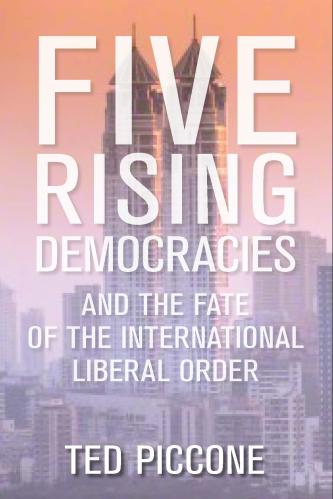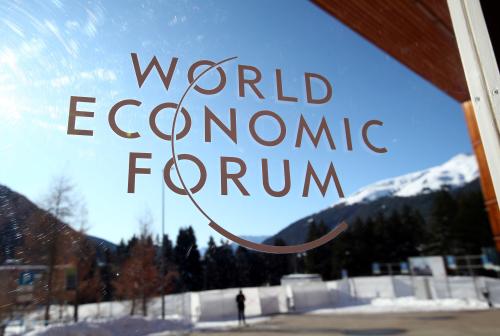Last week, one of the largest gatherings of wealth in human history took place in Davos, Switzerland when the 50th meeting of the World Economic Forum convened for five days of conversation on “improving the state of the world.” The defining characteristic of the meeting, which brought corporate titans, plutocrats, and political leaders (including President Trump) together in one of the world’s most beautiful mountain valleys, was that this was a gathering not of the 1%, but of the .000001%.
It is appropriate to criticize the World Economic Forum as an elitist gathering of the super-rich. Billionaires lobby to get all-access badges for the week and then share self-important selfies with the word “Davos” prominently visible. At plenary sessions, the values of capitalism are extolled, risks to the global economy considered, and the relationships between economic trends and governmental policies debated. At invitation-only receptions, at exclusive piano bars, and on the ski slopes, cards are exchanged, introductions made, and business deals concluded. On its face, Davos appears to be a meeting out of touch with the times, focused more on privilege than social change, economic displacement, or cross-cutting global challenges.
It is, however, in these precarious times that we need Davos more than ever. Economic and corporate leadership on global governance challenges is so urgently needed today for two reasons: First, political leadership around the world is stalled or gridlocked, preventing progress; and second, the global challenges we face — from climate emergency to the perils of populist nationalism, from the regulation of cyberspace and the ownership of data to the dangers and opportunities of mass human movements — cannot be solved without action by wealth-holders and decisionmakers of the corporate community.
The failure of political leadership to address these challenges is evident on a global scale. President Trump’s retreat from U.S. leadership is but a symptom of a larger movement by national governments to look inward, build fences with the outside world, and hope for the best. From Boris Johnson’s Brexit to Jair Bolsanaro’s realignment of Brazilian foreign policy, from Narendra Modi’s turn to populism in India to Viktor Orbán’s version of Hungarian nationalism, governments across the globe are retreating from our common challenges. While China may now have the resources to lead, President Xi Jinping is more concerned with domestic economic trends and spreading China’s influence through the Belt and Road Initiative than addressing climate or migration. When governmental leadership fails on such a scale, the engines of governance, the resources to address collective challenges, and the political will to act must be found elsewhere. The gathering of corporate leaders and the super-rich in Davos last week is one such place.
At the same moment that governmental leadership has faltered, the nature of our collective global challenges has shifted in ways that make corporate leadership and economic might all the more important. Take, for example, the climate emergency facing humanity today. At the inter-governmental meetings of the United Nations Framework Convention on Climate Change in Madrid last month, little progress was made. Just 100 companies are responsible for close to 70% of the global emissions that cause climate change. If national governments are unable or unwilling to regulate them, then the corporations themselves must become the source of change. Those corporations were not represented at the state-based negotiations in Madrid, yet they have the direct capacity to change their own behavior and, in coordination, can meaningfully mitigate climate change. If Davos can become a forum for political pressure and venue for commitment and coordination to make that change, then it has a critical role to play in today’s global governance.
The score card on climate at this year’s World Economic Forum was far from perfect. The emissions of participants attending the meetings were staggering. But, progress was made. Climate was the issue that garnered the most debate and discussion during the meetings. At Davos, a group of the world’s largest pension funds pledged to decarbonize its asset holdings through the Net Zero Asset Owner Alliance. So too, at Davos, 140 of the world’s largest companies pledged to work together to develop environmental, social, and governance metrics. Other major corporate actors, from Black Rock to Microsoft to Lloyds pledged to cut or eliminate their corporate emissions. Business as well as government leaders joined Salesforce CEO Marc Benioff’s commitment to plant 1 trillion trees to replace some of the 3 trillion lost since the industrial revolution. Governments could have taken these steps on their own through significant regulation, but lack the political will to do so. Corporations are starting to do so on their own. As they tout their accomplishments at Davos, they can and do bring others along with them.
The rise of populist nationalism around the world stands out as a second critical governance challenge, in large part because it often undermines the effectiveness of global institutions and urgently needed transnational coordination. Governments have proven loath to address the challenge, precisely because many depend on populist nationalism for their own political support. Yet, at Davos, billionaire investor and philanthropist George Soros underscored the threat posed by nationalism and did something about it, pledging over a billion dollars to the Global Society University Network to fight authoritarian rule and nationalist politics. Other corporate CEOs and financial leaders have the opportunity to join him in this critical cause. Similar developments can be seen on challenges such as migration — corporations have the power to transform economies to avoid one of the prime drivers of migration and to create employment opportunities for those already displaced. Likewise, on cyber and privacy issues, governance challenges cannot be overcome without participation and leadership from the companies that control the networks and own the data.
Solving the collective challenges of today and tomorrow requires leadership from and coordination of the global business community more than ever before. The World Economic Forum is perhaps the best, and certainly the most significant, global gathering of corporate leaders and those with the resources to make a difference at the scale needed today. True enough, what came out of Davos on each of these issues were but individual or corporate commitments, not regulation and change on a global scale. Perhaps these are merely token gestures by those with the capacity to offer them and, in the case of climate, by many who contributed most to the problem in the first place. But they do represent acts of leadership so critically lacking among many of our political elite. What is needed is to transform these one-offs into coordinated, scalable, transnational action. The World Economic Forum is one of the few places that can be achieved.
One meta question looms large: Can the interests and values of the plutocrats and CEOs at Davos be aligned with our own — with the need to rebalance the global economy to be more inclusive, to meet the climate emergency head-on, or to protect our data and our security? Fifty meetings in Davos have not answered that question and have left many, rightly, skeptical. But, at this meeting, where teenage climate activist Greta Thunberg was a bigger star (and hopefully opinion-setter) than U.S. President Trump, and where (at least a few) CEOs and government ministers joined youth from around the world in Greta’s climate march down the main street of Davos, there is reason for optimism, at least on climate. On other challenges, like income inequality, corporate interests may never align with “woke capitalism.” Davos cannot provide the solution to governance challenges alone. Since governments seem unwilling or unable to address the challenges we face without corporate leadership, power and wealth must be united to drive the changes on which our collective future depends.







Commentary
The World Economic Forum deserves criticism, but we need it now more than ever
January 28, 2020